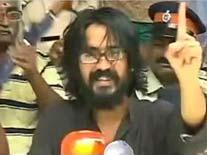
Mumbai, September 10: A Kanpur-based cartoonist, Aseem Trivedi, was remanded to police custody till September 16 by a Mumbai court on Sunday for allegedly posting seditious content on his website. His website has also been blocked.
His arrest gas been criticised by voices from across the board. The Chairman of the Press Council of India, Markandey Katju, compared the arrest to Nazi war criminals.
"The policemen who make such illegal arrests cannot take the plea that they were obeying orders of political superiors. In the Nuremberg trials, the Nazi War Criminals took the plea that orders are orders, and that they were only obeying the orders of their political superior Hitler. But this plea was rejected by the International Tribunal which held that illegal orders should be disobeyed," Mr Katju said yesterday.
The police had arrested Mr Trivedi on Saturday on the basis of a private complaint filed in December last year.
The complainant, Amit Katarnavea, a lawyer and a member of the Republican Party of India, had alleged that Mr Trivedi had put up banners, mocking the Indian Constitution, during Anna Hazare's anti-graft rally held last year at the Bandra Kurla Complex in Mumbai and also posted obscene content on his website.
"If telling the truth makes one a traitor, then I am happy. Likewise even Gandhi, Bhagat Singh are traitors. If while doing service to the nation I am booked under sedition, I will continue to do so and get arrested," Mr Trivedi said after his arrest.
AK Khan, a friend of Mr Trivedi, alleged that the cartoonist is being repeatedly manhandled since his arrest. India Against Corruption or IAC, which has been attacking the government over a series of alleged scams, has lent support to Mr Trivedi, saying the arrest is politically-motivated.
"If anyone is talking against corruption, proclaiming it as anti-national and slamming charges of sedition, one needs to understand that this (drawing cartoons) is against the government and not against the country," said Mayank Gandhi, a member of IAC.
"He is not a member of IAC but is fighting against corruption and we are here to lend him moral support," Mr Gandhi added.
"Whoever raises their voice against corruption is termed as a seditionist, anti-nationalist and a Naxalite," said Preeti Menon, member IAC.
Last month, the court had issued a non-bailable warrant against the cartoonist. A police team was sent to his residence in Kanpur but he wasn't traceable; so his parents were informed and the warrant was served.
"Whenever he started drawing cartoons, it was in the welfare of the country and when he organised this exhibition of his cartoons on December 25, 26 during Anna's movement at MMRDA grounds last year, then some member of the Maharashtra Congress Committee filed a writ in the High Court and based on that Police issued a warrant without any prior information," said the cartoonist's father Ashok Trivedi.
The police insist that the arrest is a procedural formality, saying they have acted on a complaint. The First Information Report states that the accused had put 'ugly and obscene content' on his website.
"He has shown disrespect to the National flag and therefore he has been arrested under section 124 A," said Chandrakant Bhosale, Senior Inspector, Mumbai Police.
The arrest comes at a time when Mr Trivedi was scheduled to visit Syria to collect the 2012 Courage in Editorial cartooning award. He was scheduled to fly on September 12.




Comments
Add new comment